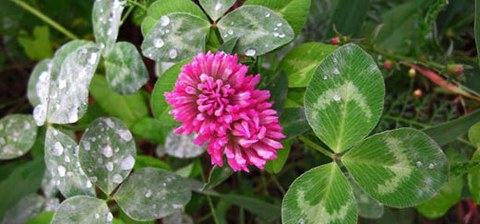Meet the regional ambassadors: How experience becomes expertise
(Interview from 2012)
Steffi Eckold
As a child, he spent his vacations helping with the coffee and peanut harvest. Today, Germain Jean Magloire Ketcha Wanda from Cameroon studies the therapeutic effects and medicinal uses of plants. He wants to share his experience as a doctoral student at TU Dresden (TUD) – as a regional ambassador.

Germain Jean Magloire Ketcha Wanda's doctoral research was on plant pigments.
Germain Ketcha Wanda has happy memories of his childhood. The second youngest of ten siblings, he grew up in the small town of Bangangté in Cameroon. His father was a civil servant and for a time had a seat in Cameroon's parliament. During school vacations, Germain Ketcha Wanda helped his mother on the farm. They harvested coffee as well as corn, and peanuts. He fondly remembers hunting and fishing trips. "I had a good collection of hunting trophies back then," he says.
The small town of Bangangté has been home to a private university since 2000. Budding academics can choose between a total of nine state universities across Cameroon. Things were different when Germain Ketcha Wanda decided to study after graduating from school in 1990. The only state university back then was in the capital, Yaoundé, 240 kilometers away. "I had no choice but to move to Yaoundé. It was the only way to study in Cameroon." The choice of subjects was also limited. He was interested in medicine, so he began a Bachelor's degree in zoology. For his Master's, he specialized in animal physiology, and graduated in 1999 with a Diplôme d'Études Approfondie (DEA) – which opened up the possibility of a doctorate.
His ties to TUD came about by chance. In early 2000, he met an old school friend who was studying for his doctorate at TUD and happened to be on vacation in Cameroon. That friend put Germain Ketcha Wanda in touch with the TUD research group led by Günter Vollmer, Professor of Molecular Cell Physiology and Endocrinology. But how did he make the scientific leap from animal physiology to cell physiology? "The subject of my Master's was, of course, different than the area the research group was working on. I had to revise my thesis proposal a few times before it was right," he recalls.
A DAAD grant in August 2001 finally cleared the way for a doctoral project in Dresden, which he started in 2002. Germain Ketcha Wanda, who had never been to Europe before, flew to Dresden via Zurich. "I saw houses with red roofs for the first time from the window of the airplane. How they were built and laid out was fascinating," he says, describing his first impressions. His wife and two sons came to Dresden with him. In January 2005, his third child was born, a daughter. "We named her Astrid. She is our great reminder of Germany," he explains. Germain Ketcha Wanda has often thought back to happy times in Germany since he returned to Cameroon in 2006. Excursions to the Spreewald, climbing in Saxon Switzerland, and canoe trips along the Elbe. And, of course, work on his thesis, which explored plant pigments of the tropical tree Millettia griffoniana, used as a medicinal plant in Cameroon, and their possible therapeutic use. He found the working conditions at the department ideal. "There were no difficulties during my research period and all the staff were friendly and helpful". His only regret is there are many colleagues he has not managed to stay in touch with since he left Dresden.

Like Dr. Ketcha Wanda, researchers in Dresden are investigating how isoflavones – plant constituents – work. Better known isoflavones such as genistein are found in red clover.
Germain Ketcha Wanda has been lecturing in biology at the University of Yaoundé I since 2007. His focus is on further research into specific isoflavones of Millettia griffoniana, and he continues to work closely with his doctoral supervisor Prof. Vollmer in this area. "I believe that natural medicine is a rich source to be mined. In many developing countries, knowledge of the power of this medicine is still based on personal experience. We need to study the therapeutic effects of more plants and record their characteristics at a scientific level. That will in future enable us to examine their benefits, their side effects, and also their toxicity," he explains, adding that "plant diversity in Africa and in Cameroon in particular is enormous. We just need to study those plants and find out which ones are useful to humans and how."
In early October, Germain Ketcha Wanda will return to TUD for the first time in six years. He is taking part in the alumni symposium on "Bioactive principles of medicinal plants and diet" organized by his doctoral supervisor, Prof. Günter Vollmer, who has dedicated many years of research to natural plant substances. Germain Ketcha Wanda is looking forward to the week. "I have high expectations for the symposium. First of all, it will tell me in more detail about current research in molecular cell physiology and endocrinology. I also hope to build research links and share experiences and expertise."
He has also been sharing his knowledge as a TUD graduate as a regional ambassador since June 2012. He wants to tell people in Cameroon about TUD, is planning information events, and is seeking to establish contact with German-speaking institutions in his country. The reasons are simple: "The number of young Cameroonians wanting to study in Germany is growing steadily. It would be great to be able to inspire some of them to study in Dresden," says Germain Ketcha Wanda.
